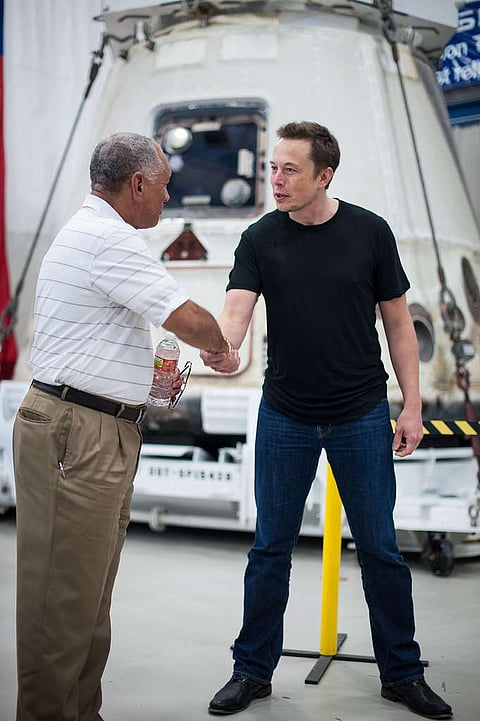

Elon Musk has consistently ranked as the richest person in the world, a position that demands a level of intelligence, business acumen, and strategic foresight that few can rival. Regardless of opinions on his leadership style or public persona, his ability to build and scale companies to dominate their respective industries is undeniable.
One of the key drivers of Musk’s fortune has been Tesla, his financial powerhouse. While he is often associated with the company's success, Tesla was not his invention. The company was founded in 2003 by Martin Eberhard and Marc Tarpenning, with Musk joining later as an investor during its early funding rounds, keyword - investor.
Elon Musk did not create Tesla. He did not invent its batteries, nor did he contribute engineering expertise to its early designs. The company was founded in 2003 by engineers Martin Eberhard and Marc Tarpenning, who developed the initial vision for electric vehicles. Musk entered the picture in 2004 as Tesla’s largest investor, leading a $6.5 million funding round and becoming chairman of the board.
So the question that should be asked is simple - how did Elon Musk get his money?
Elon Musk’s journey to becoming the world’s richest man began with his first company, Zip2. While often credited with being a tech visionary, Musk did not introduce groundbreaking innovations at this stage—what he demonstrated was strong entrepreneurial skill.
Zip2 was a software company that provided online business directories and city guides, a concept that was not revolutionary but had clear commercial potential. He assessed opportunities, conducted feasibility studies, and brought the idea to market. Rather than developing cutting-edge technology himself, he convinced investors to back his vision and secured funding to launch the company.
There have been claims that Musk’s early ventures were financed by wealth from his father’s stake in an emerald mine in South Africa. Musk, however, has repeatedly denied receiving direct financial support from his father, though he has acknowledged that his family was relatively well-off during his upbringing. Regardless of how he started, what is undeniable is that Musk successfully built and sold Zip2 to Compaq in 1999 for $307 million, netting him $22 million—a major stepping stone that enabled his later ventures, including X.com, which would evolve into PayPal, and that netted him 150 million US dollars,
And then Elon Musk came in contact with Tesla.
When Elon Musk became involved with Tesla, he didn’t invent the company or its technology, but he did shape its vision. One of his earliest contributions was insisting that Tesla’s first car should be a high-performance sports car rather than a conventional electric vehicle. This strategic decision was part of a rebranding effort to make electric cars exciting and desirable, rather than slow and utilitarian. Musk also played a role in refining the car’s sleek design, making it more appealing to consumers.
Musk’s leadership extended beyond branding—he was instrumental in securing $228 million in funding for Tesla by 2007, including $70 million of his own personal money. However, his growing influence led to power struggles within the company. Tensions between Musk, Tesla’s original founders, and the board escalated, leading to the departure of both co-founders. Over time, Musk consolidated control over Tesla, eventually becoming its dominant figure. His leadership was vindicated by the overwhelming success of the Model S, which became a breakthrough for Tesla and solidified the company as a major player in the auto industry.
However, what goes up must eventually come down. Musk’s ego and overconfidence—fueled by Tesla’s early successes—led to overpromising and underdelivering. In 2017, he confidently stated that Tesla would produce 200,000 Model 3 cars in the second half of the year. The reality? Only 50,000 were delivered. The Model S had been a triumph, but Musk’s inflated expectations led to delays, production bottlenecks, and financial strain—a recurring theme in his leadership across multiple ventures.
Musk’s ambition has always been a double-edged sword. While it has propelled Tesla and other companies to success, it has also led to missed deadlines, manufacturing struggles, and PR disasters. His tendency to make bold claims—often without the ability to back them up on time—has been one of the defining contradictions of his career.
Of course, that is without mentioning the labour law violations, the whistleblower allegations of what is going on in the Tesla factories, and the SEC, the lawsuits are still ongoing.
Discussions about Elon Musk’s political ambitions, personal beliefs, or social controversies fall outside the scope of this analysis. The real question remains: Is he truly a Tony Stark-like genius, or is he simply a shrewd businessman?
By all measurable evidence, Musk is an exceptional entrepreneur with a keen eye for business opportunities. He has successfully built and scaled multiple companies, secured billions in funding, and positioned himself as a central figure in industries ranging from electric vehicles to space exploration. However, calling him a genius innovator would be giving him too much credit. Unlike Tony Stark, Musk has not personally developed any of the core technologies behind Tesla, SpaceX, or any of his other ventures. Instead, he has leveraged the talents of engineers, scientists, and designers while using bold marketing, aggressive leadership, and strategic investments to drive his companies forward.
Musk’s narcissistic tendencies and social awkwardness are well-documented, making him a polarizing figure. His public feuds, erratic behavior, and difficult relationships paint the picture of a man who, while brilliant in business, may be challenging to work with on a personal level. His spats with former spouses, disputes with colleagues, and confrontations on social media suggest that emotional intelligence is not one of his strong suits.
Ultimately, Musk is not Tony Stark—he is not an engineer crafting revolutionary technology in a lab. He is, however, an immensely successful businessman who has reshaped multiple industries through ambition, marketing, and strategic leadership. Whether history remembers him as a visionary or simply a savvy opportunist will depend on how his legacy unfolds in the years to come.